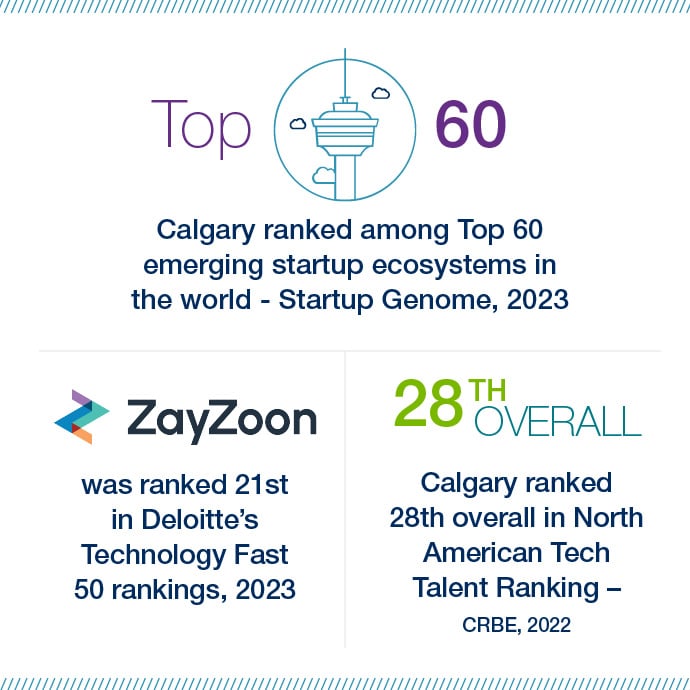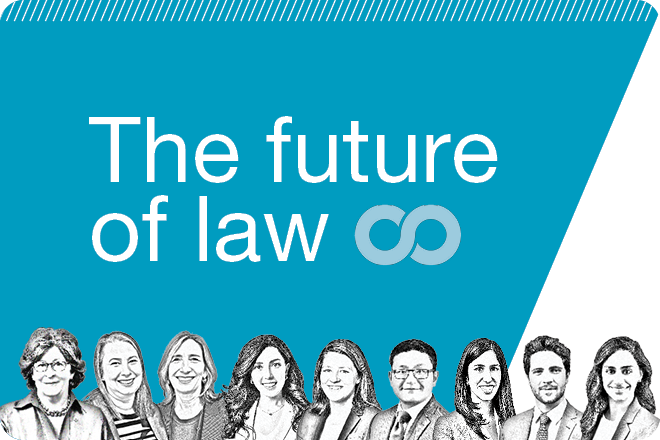Calgary’s technology industry is exploding, with buzzworthy companies setting up shop in a city historically known for oil and gas.

A name on the lips of those tapped into the tech industry is ZayZoon, a Canadian success story that recently raised US$34.5 million in a series B financing deal with the help of BLG. Partner Cameron MacCarthy’s conversation with ZayZoon co-founder and CEO, Darcy Tuer, offers some friendly advice for startups, including why ZayZoon and other aspiring tech businesses are finding success in Calgary.
Cameron: It’s hard to believe it’s been seven years since you and Craig first introduced me to Tate and we discussed this business idea. You’ve been on an incredible journey since inception. I think startups would appreciate hearing some of the lessons you learned from starting ZayZoon.
Darcy: First, I’d say the success of a tech company is tied to who you are. It’s important to first establish your why — why you’re doing this in the first place — and then bring in the right people that understand and can execute on that why. I always say that you’re the average of the five people you spend the most time around. Investors are investing in the CEO, the founders, and the teams they assemble.
My second piece of advice is to deliberately build relationships that aren’t just transactional. Calgary’s network is about three degrees of separation. It’s a connection-based city, and the ZayZoon team has spent over 15 years crafting those personal and professional connections to allow us to grow to the level we’re at today.
But forming connections isn’t just about what the other person can do for you. It goes deeper. It’s about sharing your story and message with people and learning from each other. Whether you’re an oil and gas company, a wealth services company, or a hair salon, your dream is to do something and then you entice people to come along on that journey with you.
Cameron: Why did ZayZoon set up in Calgary?
Darcy: My entrepreneurial career started here, and I love this city. If I think high level, building ZayZoon is a way to build enterprise value in Calgary, to support future entrepreneurs and to create an amazing environment for my kids and other people’s kids. That’s my why. I want people to see something purposeful happening here — that it’s a place where successful businesses are driving the economy forward.

Cameron: In your experience, what is the biggest challenge for startups when raising capital?
Darcy: One of the most beautiful things about starting your own company is you can use it to create an outcome for yourself. Where it gets tricky is when you confuse your personal goal — like being independently wealthy — with the company’s success.
For ZayZoon to continue growing, we needed to raise institutional capital. We needed to swing for a home run, not just a base hit. It was 20 times the work, and our chances of connecting with the ball were smaller. But we’d already hit a single or a double. We wanted more.
One of our institutional investor says that what we’ve done is like winning a gold medal; that’s how hard it is to get to our stage. The bad news is that we have to win gold again. We’ve just signed up for five to seven more years of pain and suffering with no guarantee of success — which isn’t a great fit if our personal goal is to walk away wealthy.
Luckily, I sat my founders down prior to signing the term sheet and we agreed that what drives us isn’t the monetary outcome. I’m not saying that money isn’t valuable to us — it is. But we want to have an impact. Our institutional investors tell us the most successful companies they’ve backed have been started by people who want to be part of something bigger than them, part of something that has a purpose. Not just making money.






